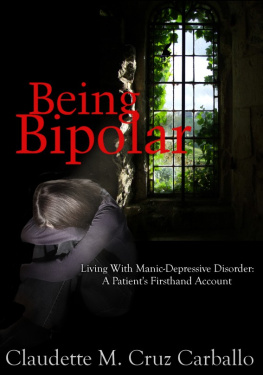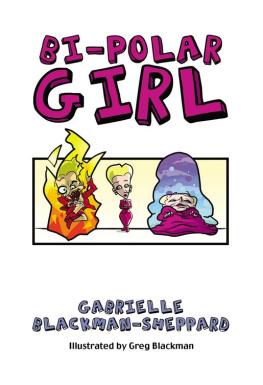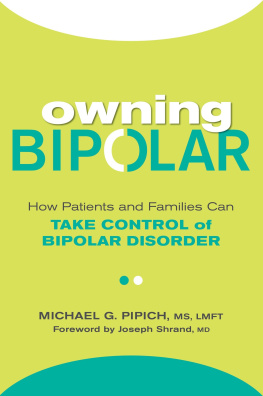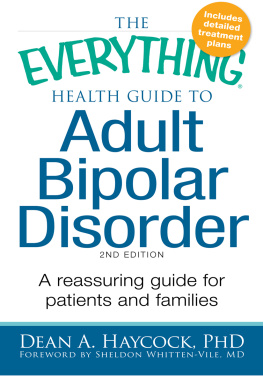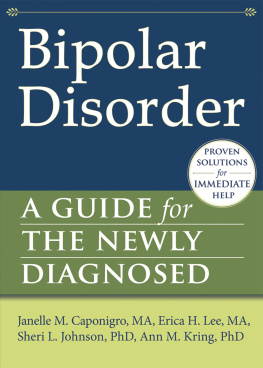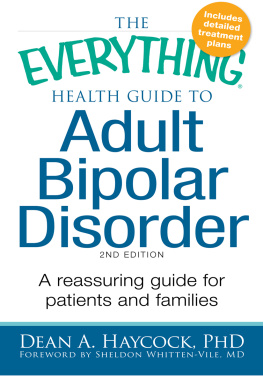Being Bipolar
Living With Manic-Depressive Disorder:
A Patients Firsthand Account
Being Bipolar
Living With Manic-Depressive Disorder:
A Patients Firsthand Account
By Claudette Cruz
Copyright 2013 by Claudette Marie CruzCarballo.
Smashwords Edition
Cover Art by Dark Dawn Creations
http://www.darkdawncreations.com
Publishers Note
No part of this publication may bereproduced, stored in a retrieval system or transmitted, in anyform, or by any means, electronic, mechanical, recorded,photocopied, or otherwise, without the prior permission of thecopyright owner. All rights reserved.
Dedication
Id like to dedicate this book to all thosepeople out there struggling with a mental illness. I know its noteasy to deal with life; I know its not easy to let go of youranger and frustration, but try to. Get help. Stick to yourtreatment, or adjust if it needed, but do this all under theguidance and supervision of your medical professional. Do not beafraid to speak, to express what youre feeling. Others cant readyour mind, so make sure they know how they can help you feel betteror better understand you.
Acknowledgements
Id like to thank my mother, Marie C. L.,for all her patience and support. I probably would not be aliveright now if not for her. My life-changing psychiatrist, Dr. HectorRodriguez Perez, has my lifelong gratitude for being sounderstanding and for being there for me in the most criticalmoments of my life. Id also like to thank Jamiely R. P., mychildhood friend, the best friend anyone could ever ask for, forhaving been by my side for so many years, through the good and bad.Weve had our fights and disagreements, but she understands me likeno one does. Jeffry, my boyfriend as of the time of thispublication, also deserves a heartfelt mention for being sosupportive and for believing I could do this. Thank you for takinga leap of faith where I was concerned, and for allowing me intoyour heart and home.
Foreword
Let me start by clarifying something: thisis not a medical textbook, nor is it meant to be used as adiagnostic tool or as anything other than a narration of the life Ihave experienced living with bipolar disorder. The purpose of thisbook, I hope, is to share how bipolar disorder has affected mylife, and how it may similarly affect the lives of people livingwith the disease, not to mention their loved ones. Not a week goesby when I dont encounter some sort of article or video about someperson who became unhinged and killed others. Often, out ofignorance, people lump in bipolar patients and other people withmental illnesses with your common criminals. I want to change thatthrough my story.
I want to change peoples perspective onbipolar patients. I want to spread awareness about how its like,how I see things, what I feel. Many times people will tell me thatIm being unreasonable, that Im not making sense, when my mind,according to my different process of reaching a logical course ofaction, tells me Im in the right.
People not walking in our footsteps find ithard to grasp what we go through. You dont know how sick I am oflistening to my mother tell me to make more of an effort, that Iwas not being cooperative when I couldnt get out of bed in themornings to go to college. Im not lazy. I never have been. When Ihave the energy, Ill exercise for an hour straight, or go on acleaning spree, or work for hours without a break. My problem isthat Im pretty much chronically depressed. Its not a milddepression either; my depression is so severe that I feel like mybody is sinking into itself. It feels like Im caving in. Taking abreath is so hard that I feel exhausted just from inhaling andexhaling.
I feel particularly blessed in that I amsmart enough and possess enough eloquence to express myself. Noteveryone can. I want to be the voice for those people, my fellowsufferers. It really frustrates me when no one seems to understandme, to understand what its like to be judged and looked down upon.Some of my volatile incidents, when Id get violent, before I wasmedicated, stemmed from me reaching a snapping point when my familywas harassing me. Id get frustrated, especially because I couldnot explain what was going on, why I didnt want to get out of bed,why the tears would burst out over the slightest provocation.
When my brother was hurling insults, rantingabout how I was useless and good for nothing and just lazy, it hurtso much because I couldnt explain why he was wrong. Id burst intears out of frustration. Those hurtful epithets were fallacious,but I was angry that I couldnt give a solid reason as to why theywerent when in all appearances he was completely right. My fatherwould also verbally abuse me, and to this day, I cant seem to talkto explain myself reasonably to him without bursting into tears,even though now he knows what was happening back then.Unfortunately, ignorance about my condition pretty much shaped theway my relationships with my family developed. To this day, I fearmy dad, try to avoid making my brother think badly of me, and amvery dependent on my mother for everything.
I grew up. I went through high school andcompleted some college. I learned to express myself better, andonce my condition was diagnosed, everything clicked. Talking thingsover with psychiatrists was invaluable. They helped fill in theblanks. They explained why this or that symptom was occurring. Theyexplained something crucial that I would like to get across outtheredepression doesnt manifest itself only through tears andsadness. There are lots of other symptoms that are manifestationsof depression, and its essential that people not in our shoes getthat through their heads. Depression isnt just about tears, justlike the manias a bipolar person experiences are not expressedsolely through irritability. Later on in this book I will furtherdetail how my ups and my downs have manifested themselves. I feelits very important to pay particular attention to those chaptersif you purchased this book in the hopes of trying to understand thebehaviors of that family member or acquaintance in your life whohas been diagnosed with manic-depressive disorder, i.e. bipolardisorder.
Disclaimer: I have omitted the names of themedications for copyright and trademark reasons.
Growing Up
Looking back, Im surprised no one suspectedanything was wrong with me sooner. I can clearly recall how, evenas a child, I have always been plagued by the symptoms of bipolardisorder.
I was basically raised by my grandparents.Both my parents worked full time, and they lived about 30 milesfrom my school. The area where their house was located did not havemuch to offer in terms of a quality education, and my motherthankfully insisted my brother and I attend private school, so myparents picked a school located very near my grandparents house,thus ensuring that wed be picked up from school on time and that,in case of an emergency, my grandparents could easily pick usup.
My grandfather, whom my brother and Inicknamed Apa, would pick my brother and I from school around3:15 p.m. and take us to his house. My grandmother, whom wenicknamed Lela, would usually be cooking by then. Since I wastheir only granddaughter and my brother their only grandson, mygrandparents were very doting. There was no way my grandmotherwould risk us being hungry if we had not had lunch in school. Theyaccommodated their lives around us, and wed have very earlysuppers with them, real suppers, not boxed mac and cheese or aPB&J sandwich. No, my grandmother would cook healthy, goodmeals for us every single day. After sharing supper, my brother andI would usually watch TV until our parents got off work around 5p.m. They would pick us up in the evening and wed do the hour-longride back to our house.

